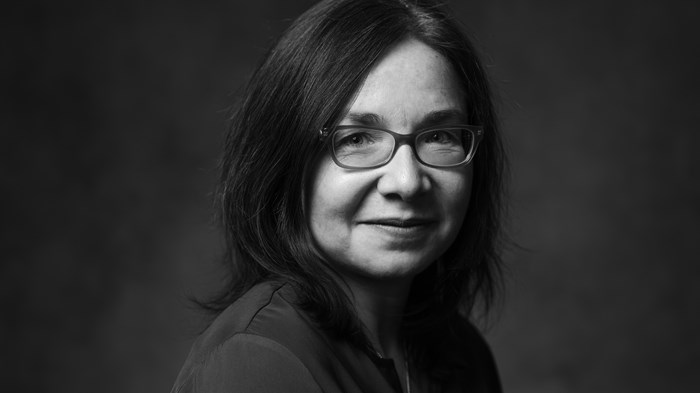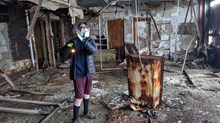I’m a Climate Scientist Because of My Faith—Not in Spite of It

I never used to talk about why I became a climate scientist. Getting personal about our work is something we scientists are trained not to do. Leaving our deeper motivations at the door of the lab serves us well as we analyze data and draw conclusions. But when it comes to explaining to others—and to ourselves—why it matters, we need more.
When I was nine years old, my family moved to Cali, Colombia, where my parents spent several years working at a bilingual school and helping out with a local church. We lived in a whitewashed, red-tiled row house in a lower- to middle-class area. We had electricity and running water most days, and we’d fill up the kerosene lamp and the bathtub for when we didn’t. But we often spent the weekends visiting far-flung barrios where houses of mud bricks and tin clung to the side of a mountain, or remote villages that lay several hours up a rutted, puddle-filled dirt road. There, the toilet was simply a wall to stand behind—wearing a skirt made it a lot easier—and lunch consisted of rice, plantains, and the guinea pigs that were slowest to run.
Our vintage 1969 Ford Bronco would be packed with everyone who needed a ride there or back, plus my dad’s telescope—an avid amateur astronomer, he’d often host impromptu viewings of the moon and Saturn’s rings. If it had been raining, I’d be propped up in the driver’s seat, one toe barely reaching the clutch, to steer while everyone else got out to push the truck through the mud.
Disasters hit us hard here in North America, but our recovery is cushioned by private and public services, from home insurance to disaster relief. In Colombia in the 1980s, life was challenging at the best of times: poverty, inequality, lack of clean water and health care; corruption and danger from the mafia, the guerrillas, the paramilitaries; reverberations from the atrocities of “La Violencia” in the 1950s still echoing through many rural areas. When disaster struck, it could be devastating. When rains came, entire neighborhoods were swept away. When drought hit, people starved.
Inspired by my dad’s love of the night sky, I decided to study astrophysics when I returned home to attend university in Canada. But a course I serendipitously took on climate science yanked my focus from the stars to the Earth. I learned how climate change is making many of the risks faced by people in low income countries worse; that is why the U.S. military calls it a threat multiplier. Climate change affects our food, our water, even the air we breathe. It accelerates the destructive impacts of human expansion on natural ecosystems and it impacts our own health, our welfare, even our pocketbooks. And it exacerbates humanitarian crises: poverty, hunger, diseases, even political instability and the plight of refugees.
I learned how the vulnerabilities I saw in Colombia are reflected around the world and are being amplified by climate change. Just like the coronavirus pandemic, it’s deepening the chasm between the haves and the have-nots, pushing many more into poverty. Whoever we are, wherever we live, disasters take whatever challenges we are already facing and make them worse.
As a Christian, I believe we’re called to love others as we’ve been loved by God, and that means caring for those who are suffering—their physical needs and their well-being—which today are being exacerbated by climate impacts. How could I not want to do something about that? That’s why I became a climate scientist.
The first time I was invited to speak at a local church here in Texas, I decided the time had come to share more of my personal motivation, as uncomfortable as it might feel. After all, the reason I’m a climate scientist is because I’m a Christian. Maybe, I thought, just maybe a few of the people there might realize they cared about climate change for the same reasons I did.
It was a Wednesday night. The meeting was in one of the adult Bible study rooms, down a long hall with tan carpet. A group of about fifty interested people had gathered. I showed them the data revealing that yes, the planet is warming, and yes, humans are responsible. As I expanded on the impacts we were already experiencing in Texas, people listened and nodded along; they felt validated by what I had to say and it matched what they’d witnessed themselves. But then I took a deep breath, gathered up my courage, and for the first time ever, nervously launched into why I cared: the biblical mandate for stewardship and care for creation, the connection between climate change and poverty, and the Bible verses that directed my concern.
I was half expecting people to laugh; but instead, they seemed surprised. They recognized those Bible verses I was quoting and they lived by the same principles. And the questions I got afterward shifted: they were deeper, far more personal than I’d heard before. This audience cared. Why? Because we had connected over something fundamental and undeniable that we shared.
Excerpted from Saving Us, published by One Signal/Atria Books, a division of Simon & Schuster, Inc. Copyright © 2021 by Katharine Hayhoe.
The Better Samaritan is a part of CT's
Blog Forum. Support the work of CT.
Subscribe and get one year free.
The views of the blogger do not necessarily reflect those of Christianity Today.






















